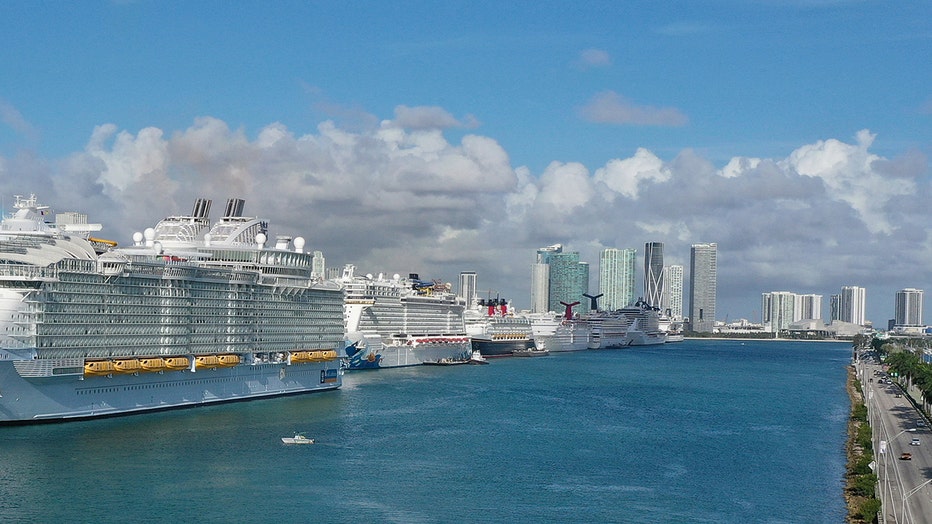CDC monitors, investigates at least 73 cruise ships following COVID-19 outbreaks
LOS ANGELES - Federal health officials announced Tuesday they are actively investigating or monitoring dozens of cruise ships following COVID-19 outbreaks on board.
As of Dec. 27, 73 cruise ships on restricted sailings were sailing at yellow or orange status, according to the Centers for Disease Control and Prevention (CDC). A restricted voyage is a cruise that has obtained a CDC-issued Conditional Sailing Certificate and is conducted with paying passengers.
According to the CDC’s website, as many as 89 vessels are color-coded orange or yellow — an even higher amount than what the CDC confirmed Wednesday. The CDC noted this number includes ships that are "crew only" or are no longer under active investigation.
Ship color is determined by surveillance data from the previous 7 days — regardless of voyage dates — and ships with orange or yellow status are currently being monitored or investigated.

Cruise ship drops off passengers and crew In Miami (Credit: Joe Raedle via Getty Images)
"This is the most number of ships we’ve had sailing since the CSO [ Conditional Sailing Order] has been in place," the CDC said in a statement to FOX Television Stations. "CDC acknowledges that it is not possible for cruising to be a zero-risk activity. The chance of getting COVID-19 on cruise ships is high because the virus spreads easily between people in close quarters aboard ships."
The CSO — which has been extended until Jan. 15 — is the CDC's current regulations and phased approach to allowing cruise ships to resume operations from the United States amid the COVID-19 pandemic.
When a cruise ship operating under the CSO notifies the CDC of suspected or confirmed cases of COVID-19 on board, CDC determines whether an investigation is needed. This investigation threshold gives the CDC and the cruise industry the ability to work together to protect the health and safety of those on board.
The agency noted it has been managing COVID-19 outbreaks on cruise ships since this summer when cruise ships resumed sailing with passengers on board.
"CDC is working with the cruise line to keep passengers and crew safe through COVID-19 mitigation measures. CDC has been collaborating with global public health and industry partners to learn about Omicron, as we continue to monitor its course," the agency’s statement continued.
According to the agency, cruise ships are allowed to relax certain onboard public health measures, such as mask use, if at least 95% of passengers and crew are fully vaccinated. However, the CDC continues to advise cruise ship operators to require masks indoors and in crowded outdoor areas regardless of vaccination status due to the increased transmissibility of variants and growing breakthrough COVID-19 cases.
"CDC recommends people to avoid cruise travel if they are not fully vaccinated and to get a COVID-19 vaccine booster dose if they are eligible. Additionally, CDC recommends people avoid cruise travel if they are at increased risk of severe illness, regardless of vaccination status," the CDC added.
This news follows increased outbreaks on cruise ships in recent months.
The CDC and other health officials are still learning more about the highly transmissible Omicron variant, including how easily it spreads, the severity of illness it causes and how well vaccines work against it.
The Omicron variant has driven up infections across the U.S. and disrupted holiday travel in recent weeks.
Earlier this month, a Norwegian Cruise Line ship with at least 10 passengers and crew members infected with COVID-19 docked n New Orleans, where health officials said they were trying to disembark people without worsening the spread of the coronavirus illness.
Norwegian Cruise Line issued a statement that confirmed a "handful of COVID-19 cases among guests and crew." The company said all of the identified cases involved people without symptoms of the illness.
The cruise line also noted it required all passengers and crew members to have been vaccinated against the coronavirus prior to departure.
Cruise ships were an early source of outbreaks in 2020 at the start of the global pandemic as some ships were rejected at ports and passengers were forced into quarantine.
The CDC imposed its first no-sail order on cruise lines in March 2020 after most companies sailing in U.S. waters had agreed to suspend voyages. The CDC issue technical guidelines for the industry five months later and began approving trial sailings in the spring.
Cruises have since sailed from Florida and other parts of the country. Most lines require adult passengers to show proof of vaccination against COVID-19.
In Oct. the CDC extended for nearly three more months its rules that cruise ships must follow to sail during the pandemic.
The extension made "minor modifications" to rules already in effect, and after Jan. 15, it plans to move to a voluntary program for cruise companies to detect and control the spread of COVID-19 on their ships.
The current regulations were scheduled to expire on Nov. 1.
The Associated Press contributed to this story.


